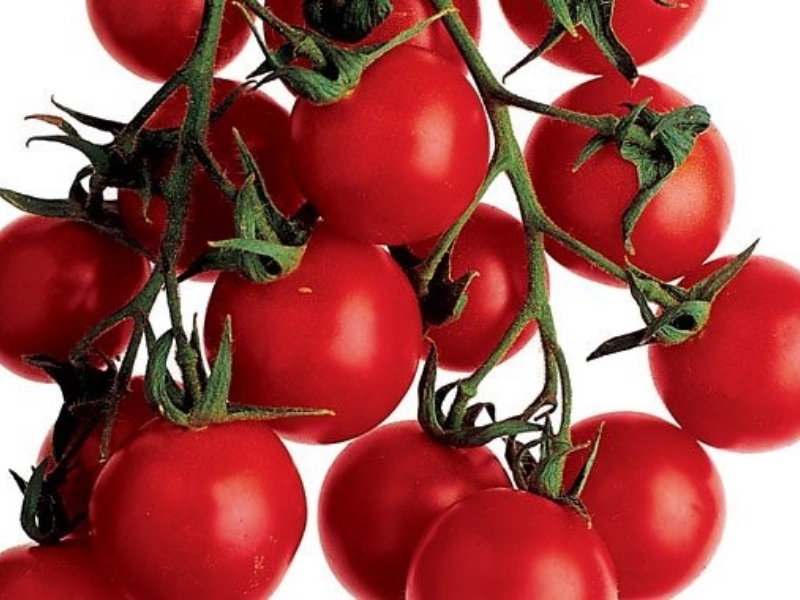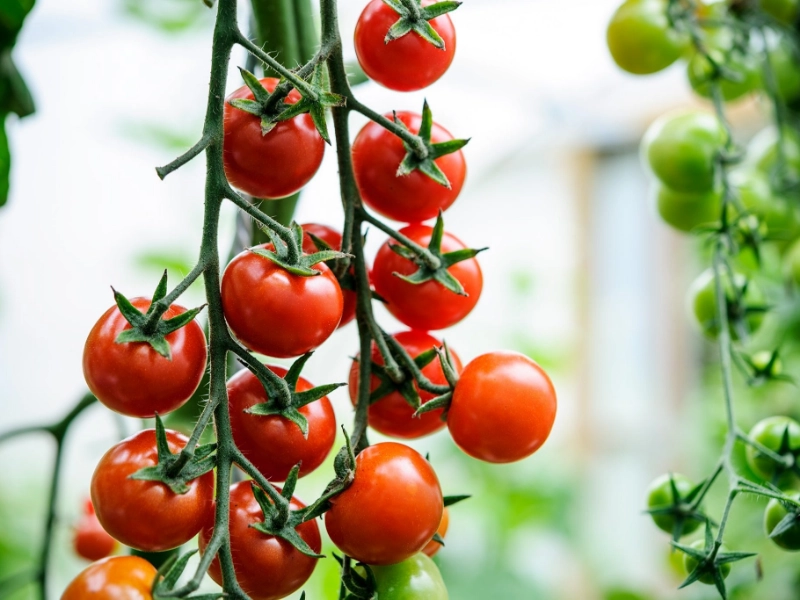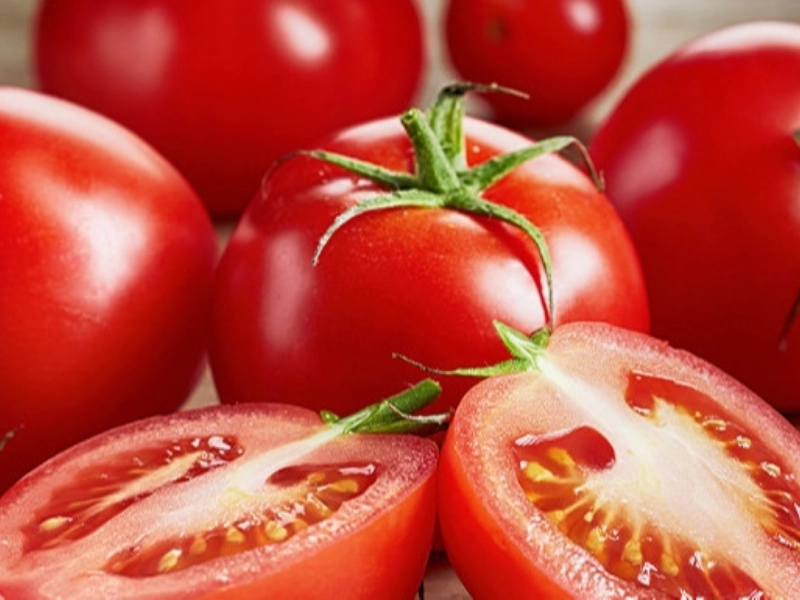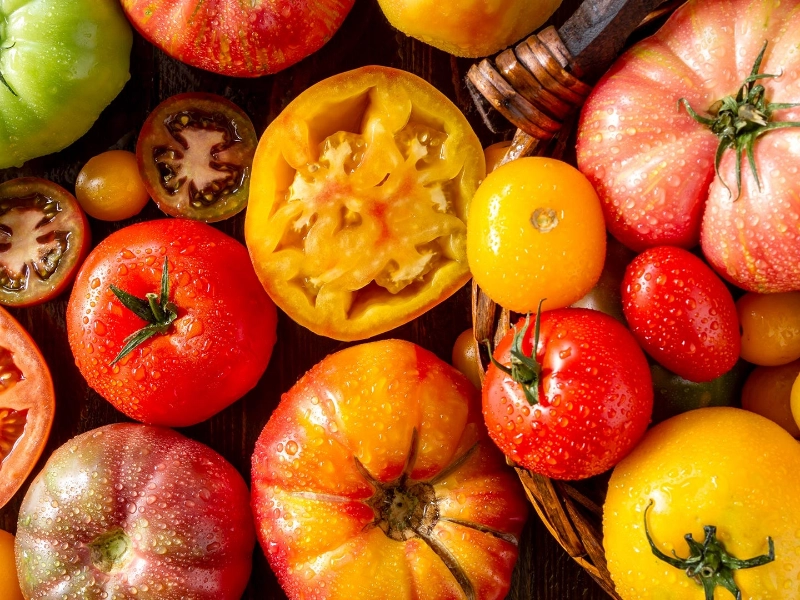Tomatoes are a rich source of important nutrients. They are an excellent source of vitamin C, vitamin A, and lycopene. They also contain a significant quantity of potassium. Tomatoes include a potent antioxidant called lycopene, which can help against cancer, heart disease, and UV damage. In addition, it lowers cholesterol and blood pressure, preventing atherosclerosis.

 Tomatoes are not only an excellent source of potassium but also a rich source of the antioxidant lycopene. This substance may aid in preventing solar damage and is known to improve heart health. Red tomatoes are the best source of lycopene, containing 530 milligrammes per cup. Watermelon, fried white button mushrooms, and clams also contain a significant quantity of this mineral.
Leafy vegetables are an excellent source of potassium. Swiss chard or kale provide you with close to 429 mg of this vitamin in one cup. These veggies are also high in calcium, iron, and vitamin C.
Vitamin A is also abundant in tomatoes. One cup of tomatoes meets six percent of a woman's daily requirement and five percent of a man's. On the other hand, oranges account for only 2 percent of a woman's daily intake and 1 percent of a man's. Oranges and tomatoes are both excellent sources of beta-carotene, which your body may use to make vitamin A.
Tomatoes are not only an excellent source of potassium but also a rich source of the antioxidant lycopene. This substance may aid in preventing solar damage and is known to improve heart health. Red tomatoes are the best source of lycopene, containing 530 milligrammes per cup. Watermelon, fried white button mushrooms, and clams also contain a significant quantity of this mineral.
Leafy vegetables are an excellent source of potassium. Swiss chard or kale provide you with close to 429 mg of this vitamin in one cup. These veggies are also high in calcium, iron, and vitamin C.
Vitamin A is also abundant in tomatoes. One cup of tomatoes meets six percent of a woman's daily requirement and five percent of a man's. On the other hand, oranges account for only 2 percent of a woman's daily intake and 1 percent of a man's. Oranges and tomatoes are both excellent sources of beta-carotene, which your body may use to make vitamin A.
 Vitamin C, which is necessary for numerous processes, is present in tomatoes in good amounts. They are also a fantastic source of potassium, a necessary element that lowers the risk of kidney and gallstone disease and helps balance blood sugar. Additionally, they contain a lot of lycopene, an antioxidant that may help fend off diseases like cancer.
You can eat raw or cooked tomatoes. They provide a nutritious addition to soups, spaghetti sauces, and salsas, as well as salads and sandwiches. They are high in potassium, iron, fiber, and folic acid, but low in calories.
Tomatoes contain lycopene, which has been demonstrated to shield skin from UV radiation. It scavenges free radicals that can harm DNA. Additionally, studies have shown its ability to assist smokers by mitigating the damaging effects of cigarette smoke on the lungs' air sacs. Furthermore, studies have demonstrated that lycopene lowers the risk of developing emphysema.
Vitamin C, which is necessary for numerous processes, is present in tomatoes in good amounts. They are also a fantastic source of potassium, a necessary element that lowers the risk of kidney and gallstone disease and helps balance blood sugar. Additionally, they contain a lot of lycopene, an antioxidant that may help fend off diseases like cancer.
You can eat raw or cooked tomatoes. They provide a nutritious addition to soups, spaghetti sauces, and salsas, as well as salads and sandwiches. They are high in potassium, iron, fiber, and folic acid, but low in calories.
Tomatoes contain lycopene, which has been demonstrated to shield skin from UV radiation. It scavenges free radicals that can harm DNA. Additionally, studies have shown its ability to assist smokers by mitigating the damaging effects of cigarette smoke on the lungs' air sacs. Furthermore, studies have demonstrated that lycopene lowers the risk of developing emphysema.
 Tomatoes have a small amount of potassium and a high amount of magnesium. They're also an excellent source of vitamin C. They are a good source of fiber and low in calories. In addition, tomatoes are a good source of vitamin A, calcium, and folic acid.
They contain a lot of lycopene, which guards against cancer and heart disease. They are an excellent source of potassium, which is necessary for healthy bones, as well as dietary fiber. Vitamin A, which lowers blood pressure and prevents vision loss, is abundant in tomatoes.
A serving of tomatoes provides 48% of your recommended daily vitamin C intake and 35% of your daily vitamin A value. They are also an excellent source of niacin, folate, and potassium. A medium tomato contains 23.4 mg of magnesium. Avocados, which are rich in potassium, dietary fibre, and heart-healthy monounsaturated fat, are another excellent source of magnesium. The magnesium content of one medium avocado is 58 mg, or 14% of the DV (7).
Tomatoes have a small amount of potassium and a high amount of magnesium. They're also an excellent source of vitamin C. They are a good source of fiber and low in calories. In addition, tomatoes are a good source of vitamin A, calcium, and folic acid.
They contain a lot of lycopene, which guards against cancer and heart disease. They are an excellent source of potassium, which is necessary for healthy bones, as well as dietary fiber. Vitamin A, which lowers blood pressure and prevents vision loss, is abundant in tomatoes.
A serving of tomatoes provides 48% of your recommended daily vitamin C intake and 35% of your daily vitamin A value. They are also an excellent source of niacin, folate, and potassium. A medium tomato contains 23.4 mg of magnesium. Avocados, which are rich in potassium, dietary fibre, and heart-healthy monounsaturated fat, are another excellent source of magnesium. The magnesium content of one medium avocado is 58 mg, or 14% of the DV (7).